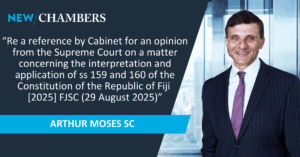
Arthur Moses SC appeared for the Fiji Law Society in the recent opinion by the Supreme Court of Fiji (Temo CJ, Arnold, Goddard, Young and French JJ, and Mataitoga P) following a reference from the Cabinet of the Fiji Government, which was delivered on 29 August 2025.
Sections 160 of the Fiji Constitution requires that any amendment be supported by three-fourths of the members of Parliament and three-fourths of the registered voters at a referendum. In March, the Fiji Coalition Government brought a Bill to amend the Constitution, which secured the support of 40 out of 55 members of Parliament at the second reading. After this defeat, the Cabinet sought the opinion of the Supreme Court on five questions the interpretation and application of the Fijian Constitution.
The State submitted that the whole Constitution is amendable by a simple majority of the Parliament without any need for a referendum. Mr Moses SC submitted that this would be a perverse and disproportionate outcome, and its interpretive approach is untethered to constitutional principles. It would have made the Constitution amendable in the same way as ordinary legislation. Importantly, the rights guarantees in the Bill of Rights—which are in part intended to be a counter-majoritarian bulwark to protect minority groups—could be trammelled by Parliament.
The Court considered that it needed to determine the issue of jurisdiction before it could answer any of the questions. This included determining whether the 2013 Constitution should be recognised as legally effective as the supreme law of Fiji. Applying the criteria of recognition developed by the common law, the Court held that the 2013 Constitution should be recognised as legally effective because of the time that has passed since its inception, the many laws passed under it and the three elections held under it. The Court took judicial notice that individuals and businesses have organised their affairs in reliance on the 2013 Constitution.
The Court held that the recognition should be qualified because ss 159 and 160 (the amendment provisions) rendered the 2013 Constitution “virtually unamendable” and effectively disempowers the people from effecting democratic change. Further, the 2013 Constitution was imposed on the people, not chosen by them. The Court held that the amendment provisions should be remedially interpreted to have a “realistic and workable mechanism” and “repair the democratic deficit”.
The Court held that, to amend the Constitution, there must be an absolute two-thirds majority of the members of Parliament and a simple majority of electors voting at a referendum. The Court also held that it does not recognise s 159(2)(c), which prevented amendments to the amendment provisions themselves. The unamendability provisions in ss 159(2)(a)–(b) for the immunity and transitional provisions were recognised in the interests of stability and continuity. The Court made declarations and gave answers to the questions accordingly.
Mr Moses SC was assisted by Professor Patrick Keyzer and Dane Luo, and instructed by the President of the Fiji Law Society, William (Wylie) Clarke from Howards Law. Professor Keyzer is the Professor of Law and Public Policy at the Australian Catholic University. Mr Luo is the Farthing Scholar in Administrative Law at Pembroke College at the University of Oxford and was elected the Vinerian Scholarship Proxime Accessit for second best performance in the Bachelor of Civil Law in 2024.
Back to all